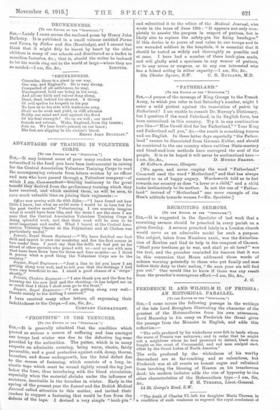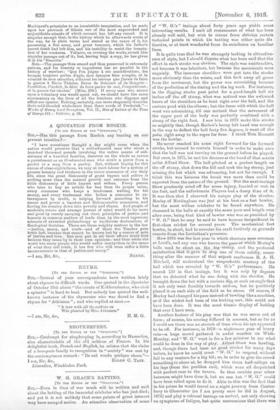FREDERICK II. AND WILHELM II. OF PRUSSIA. AN HISTORICAL PARALLEL.
ITO TYR EDITOR Or THE "sezerATon."1 SIR,—I came across the following passage in the writings of the late Lord Brougham illustrating the character of the greatest of the Hohenzollerns from his own utterances. Lord Macaulay in his essay on Frederick the Great gives the passage from the Memoirs in English, and adds this reflection:— " The evils produced by his wickedness wore felt in lands where the name of Prussia was unknown ; and in order that he might rob a neighbour whom he had promised to defend, black men fought on the coast of Coromandel, and red men scalped each other by the Great Lakes of North America."
The evils produced by the - wickedness of his worthy descendant are as far-reaching and as calamitous, but Frederiok was at all events an honest rogue and refrained from invoking the blessing of Heaven on his treacherous deed: his modern imitator adds the vice of hypocrisy to the other oharaoteristios of the Hohenzollern type.—I am, Sir, "The death of Charles VI. loft his daughter Marla Theresa in a Contrition of such weakness as exposed the royal combatant of Machiavers principles to an irresistible temptation, and he made upon her province of Silesia one of the most unprovoked and unjustifiable attacks of which account has left any record. It is singular enough that, in the history which he afterwards wrote of the war, he m plain terms had stated as the cause of it, his possessing a fine army, and great treasure, which his father's recent death had left him, and his inability to resist the tempta- tion of her weakness. Voltaire, on revising the works, struck this singular passage out of it ; but, having kept .a copy, he has given it in his Memoirs.'
Note.—The passage thus erased and thus preserved is extremely curious, and for honesty or impudence has no parallel in the history of warriors: 'Qua l'on joigne d cos considerations, des troupes tonjours pretes d'agir, mon epergne bion remplie, et la vivaeite de mon caractere, c'etaient les raisons que j'avais de faire la guerre 1 Marie Therese, Reine de Bohemia et de Hongrie- l'ambition, Pinter*, le desir de faire parlor de moi, l'impOrterent ; et la guerre fut resolue.' (Mem. 288.) If every man who enters upon a voluntary war would speak out, we should have the same commentary on the lives of all the butghers who disgrace and afflict our species. Nothing, certainly, can more eloquently describe their cold-blooded wickedness than these words of Frederick."— Works of Henry Lord Brougham, Vol. II., Men of Letters of the Time qf George III.: Voltaire, p. 59.

















































 Previous page
Previous page